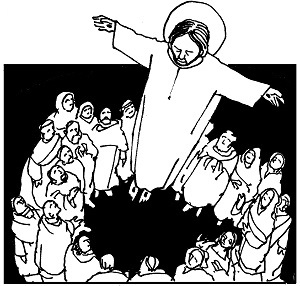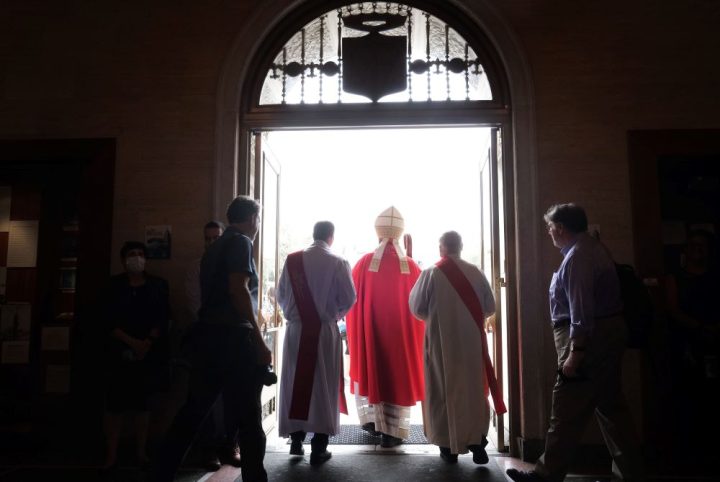
The October 2023 Synod of Bishops should include the voices of women who have discerned a sincere call to the Catholic priesthood, said women’s ordination advocate Kate McElwee in a recent guest commentary for NCR. Following are NCR reader responses to her opinion with letters that have been edited for length and clarity.
The answer to how long women must wait for ordination to priesthood is probably: forever. I was a committed, enthusiastic convert to Catholicism and served in four parishes as a lector, eucharistic minister, parish council member and RCIA director. I also facilitated sessions at a diocesan pastoral ministry formation center.
After 33 years, I left the Catholic Church, something I never thought I would do, and joined the Episcopal Church. I left for various reasons, but the primary reason was the failure to accept the reality that some women are called to the priesthood, and the only obstacle for them is their gender. Lest anyone imagine that only women leave for this reason, I know men who have as well. One said to me, « I’ll go back if the Catholic church ever values my daughter as much as it values my son. »
Our Episcopal diocese has a female bishop who was raised Catholic. She told me she felt a call to ministry as a priest and knew it could never happen in the Catholic Church. When she came down the aisle of my parish church, wearing a miter and a warm smile, carrying her crozier, I felt such joy at being part of a church that welcomes everyone’s gifts.
ELAINE CHILCOTE
Oakmont, Pennsylvania
***
Really Kate? If Christ had wanted women as priests, he would have ordained some when he selected his apostles. I, as a woman, was embarrassed to see the photo in your article of women seeking ordination, with the red dresses and umbrellas. Women seeking ordination might do well to consider showing respect for themselves and the traditions of the Catholic faith.
JOANN HENNINGSEN
Mesa, Arizona
***
I believe that holy orders should be opened up to all moral Catholics, but the Women’s Ordination Conference (WOC) looks like the Anglo-Saxon-led West — which is to say it looks more like Catholicism’s past than Catholicism’s present and future.
The demographic shift taking place within the Catholic Church necessarily involves a theological-ideological shift as well. What exactly does/will that shift mean for WOC’s goals? That question is important. I’d be interested to know how much of what the WOC is advocating has popular support outside of the collective West, among the people of God on the continent of Africa where the church is not in a state of decline.
JEFFREY JONES
Hamburg, New York
***
One of the more welcome outcomes from the synod would be the opening of the permanent diaconate to women. That step will allow the faithful to acclimate to what will be for some a radical change. If women were admitted to the diaconate, in short order that change will be seen as less revolutionary and more evolutionary and accepted as the new norm. Similarly, since we have married men in the permanent diaconate, having married priests would not be seen as radical from the perspective of the faithful. Certainly, some clerics will be apoplectic at the thought but their influence in the domestic church, as in the worldwide church, is waning.
McElwee speaks eloquently about discerning the voice of the Spirit. I think the Spirit is telling the church to evolve in accord with the culture of the 21st century, which ironically will reflect the character of the church in the 1st century. Married priests were common until the 12th century, so a married priesthood, similar to a female permanent diaconate, would have historical precedence. Perhaps the Spirit wants us to revisit our past as we discern our future.
CHARLES A. LEGUERN
Granger, Indiana
***
Once again, the obligatory women’s ordination rant. While I agree women should hold whatever offices in the church men do, it ain’t gonna happen during Pope Francis’ pontificate. He continues making major changes in the church, but women’s ordination is a bridge too far.
McElwee seems oblivious to the degree of controversy the synod is raising among the clergy, and the laity the clergy have stirred up. The synodal process needs to be able to crawl before it can walk. Why would McElwee want to kneecap an already hobbled church? To force the issue is to evoke a reactionary negative response. Why would Pope Francis waste any goodwill he has with bishops pushing an issue that will fall flat? Even if he did allow it, how many bishops would participate?
What makes McElwee think women are going to enter ministry and do as they please? The clerical hierarchy is a pecking order.
There may be value in keeping women’s ordination in front of readers. That being the case, the effort needs to be realistic. While the article has emotional appeal, it’s not practical when dealing with church realities.
MICHAEL J. MCDERMOTT
Texas, United States



